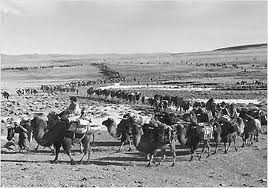After about 15 years of Christians engaging the Tibetan world, in Ladakh, Guge [a former kingdom in western Tibet], and Utsang [central Tibet].
The Portuguese mission work in India and China was coinciding with the European-Asian trade, and as new trade routes and opportunities were learned of, the Jesuits were always looking to go and explore in order to bring the good news of Jesus to those who had no Christian work. As exploration developed better and fuller information regarding unengaged and unreached peoples, Jesuits in India followed up with missional intent.
After about 5 years of successful work these first Christians living among Tibetans developing relationships, leading their Tibetan friends to the truth of Jesus’ love and provision of relationship with God, disciple-making through language-learning, writing, teaching, and forming churches. These brothers of the 17th century showed a great, death-defying love for their Tibetan brothers, at times sacrificing their lives and positions in order to cross the Himalayas, to stand up for the purpose of the gospel while under threat of death from locals and from conquering warlords.
After the fruit of the early Jesuit’s efforts in western Tibet, the conquering Ladakhi kingdom exiled the pro-Christian king and an estimated 400 local Christians. Even though this seemed an enormous tragedy, the Ladakhi king was not interested in any religious conflict but simply a political power struggle with Guge. After Jesuits ventured into Ladakh, they were given full permission from the new ruling power to continue and start new Christian teaching throughout the Ladakhi controlled areas of Ladakh and western Tibet.
The real tragedy came with the negative report from an outsider Jesuit reporting on the Tibetan work, as he advised the Jesuit authorities to recall all Jesuits from working among Tibetans due to the difficulties and threats from corrupt rulers [i.e. the new Ladakhi-appointed governor of Guge held several Jesuit brothers for ransom, whose fate is unrecorded]. The entire work among Tibetans was abandoned for nearly 60 years. One writer says of this brother’s negative report and failure to call for support, that perhaps this was an obvious case of him being the wrong man at the wrong time in the wrong place.
One final plea was sent to Europe by an elder Jesuit brother who was unable to go himself into Tibet because of the strenuous nature of the expeditions. In an annual report from Indian mission work sent back to Europe, Simon de Figueiredo calls for the sending of new young Christians into the Tibetan world so that the good work begun there will not end, and in one final statement, he says,
“Ite angeli veloces, ite ad gentem exspectantem!,”
which translates to:
“Go swift messengers, go to an expectant nation!”
This is the impetus of Jesus’ final words to his disciples: Go!, knowing that Jesus has all the authority of both heaven and earth, AND Jesus is with his people [Matthew 28:18-20].
This is the call of God upon his people, upon the churches! Go to and send out your people to live among, befriend, speak of and live out your faith in the awesome! news of Jesus’ life, death, and Resurrection to the world! [1 Timothy 2:3-4, 2 Peter 3:9, Revelation 5:9/7:9]
Jesus in our place: living the sinless, perfect, righteous life we should but don’t live, taking the punishment of our sins, raising to life again having conquered death and promising new life to all who accept God’s free gift of salvation from our sins through the sacrifice of Jesus in our place [Ephesians 2:1-10].
Go swift messengers, go to expectant nations, people groups, tribes, and languages!
Desideri, Ippolito, and Filippo De Filippi. An account of Tibet the travels of Ippolito Desideri of Pistoia, S.J., 1712-1727. The Broadway Travellers 1. London: RoutledgeCurzon, 2005.
Huc, M. L’Abbé. Christianity in China, Tartary and Thibet. Vol. 2. New York: P. J. Kenedy, 1897.
Komroff, Manuel, ed. Contemporaries of Marco Polo: Consisting of Travel Records to the Eastern Parts of the World of William of Rubruck [1253-1255]; The Journey of John of Pian de Carpini [1245-1247]; The Journal of Friar Odoric [1318-1330] & The Oriental Travels of Rabbi Benjamin of Tudela [1160-1173]. New York: Liveright Publishing Corporation, 1928.
Vine, Aubrey R. The Nestorian Churches: A Concise History of Nestorian Christianity in Asia from the Persian Schism to the Modern Assyrians. London: Independent Press, 1937.
Wessels, C. Early Jesuit Travellers in Central Asia 1603-1721. Delhi: Book Faith India, 1998.
Yule, Henry, ed. Cathay and the Way Thither: Being a Collection of Medieval Notices of China. Vol. 2. Cambridge Library Collection. Cambridge: Cambridge University Press, 2010.


